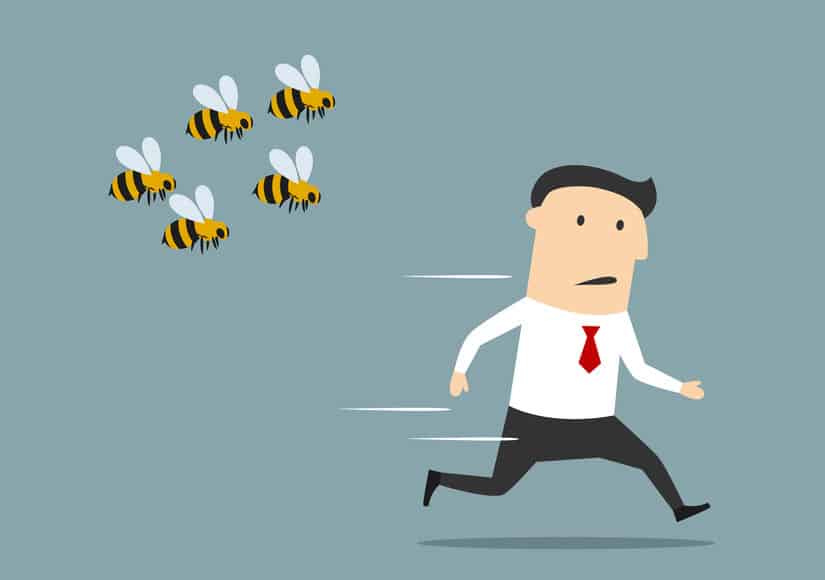Most of us have been harassed by or come under attack by wasps at some time. Often the wasp’s behavior can seem unnecessarily aggressive, so what are the facts behind their behavior.
Wasps can be aggressive when feeling a perceived threat to themselves or their nest. They are more aggressive in the fall when a reduction in their natural food supply results in them searching out sugary foods. They can be aggressive as a form of defense and have the ability to sting multiple times.
During Spring and Summer wasps are mostly only aggressive when defending their nest
Given that during the spring and summer months the wasp’s role is to feed and protect the larvae as they develop in the nest, it is not surprising that they aggressively defend the nest if they perceive a threat.
This can be problematic if the queen has built the nest in or around a populated area. Many species of wasp do build nests in and around people’s homes as they are attracted to areas that are dry and warm.

Why are wasps more aggressive in the Fall?
Wasps can be more aggressive in the fall because they are in need of sugary foods and no longer working to feed the wasp larvae within the nest. During the spring and summer months, wasps gather in their nests alongside other wasps.
In the spring the queen wasp will have built a nest and laid eggs. The wasps will help to protect and feed the larvae. They require protein so this means the wasps during this time are mostly preying on other insects. In turn, the larvae actually secrete a sweet substance that the wasps can feed off.
This means during these months the wasps are less likely to hunt for sweet foods, so are less likely to come into contact with people. They also feed on sweet nectar during the warmer months when flowers are more abundant.
By the fall all the larvae will have matured into fully formed wasps and so now the wasps free of their role as providers and without their supply of sugar from the larvae get hungry and seek out sweet foods, which often puts them into conflict with people.
Will wasps attack people unprovoked?
Usually, wasps will only attack people when they feel under threat. Unfortunately, their instinct when under threat is not to run away, but rather to go on the offensive. In other words, they see attack as the best form of defense. Unlike bees, they do not die when inflicting a sting and dangerously can even inflict multiple stings.
Wasps also have a way to call for help. When feeling under attack wasps will release a chemical that sends a signal to other wasps that there is a threat. This means that an attack can often come from more than one wasp.
Flapping at wasps in an attempt to get rid of them can, therefore, backfire. It is rather better to remain calm or reduce the risk of attracting wasps by not leaving sugary foods and drinks out in the open.
What should you do if you are attacked by wasps?
Wasps will often not stop attacking until they feel the threat to them or their nest has ended. The best action is to walk away calmly from the situation. The more panic and attempt made to swat them will likely backfire. Getting distance between you and the point of attack is important.
Can wasps do serious harm to people?
Wasps can kill people. While one sting is not enough to kill someone unless they have an allergic reaction, 30 to 40 stings have resulted in death. It is reported that on average approximately 60 people die from wasp and bee stings in the US each year.
Are some types of wasps more aggressive than others?
Yellow-jackets can be particularly aggressive if they feel their nest is under threat. Each nest can have up to 5,000 wasps. Unfortunately, they are one of the most common species of wasps in North America and they will often build their nests under awnings, which brings them into proximity to people.
Bald-faced hornets, also common in North America can also be very aggressive in defense of their nests. Their size also means that their stingers can also penetrate thick clothing.
Another common and aggressive species is the paper wasp. They are known for being territorial and like the yellowjacket and the hornet will defend their nests in swarms.
